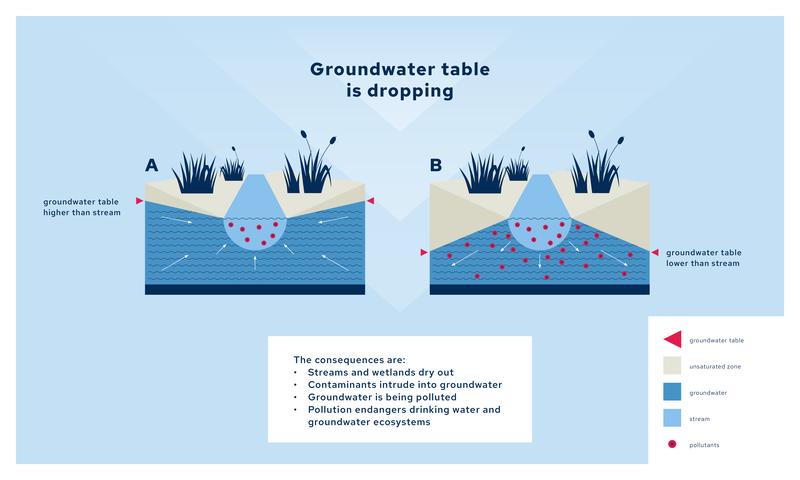
Climate Change Threatens Groundwater: Impact on Water Quality

As a result of climate change, the regional landscape water balance has reached the kipping point in many places: Due to falling groundwater levels, flowing waters are seeping into the subsoil and polluting the groundwater with their contaminants.
Credit: Sina Hurnik
If groundwater sinks, streams and rivers seep away and pollute drinking water.
Increasing drought, less precipitation, rising water demand in agriculture – climate change is causing problems for our groundwater. In Germany and around the world, it is leading to falling groundwater levels in some regions. When the underground water table is low, polluted surface water from streams and rivers finds its way more and more into the groundwater. The result: Our drinking water and groundwater ecosystems are endangered – making a problem of quantity a problem of quality too. This is what researchers are currently describing in the scientific journal “Water Research”. Their recommendation: new research approaches and regionally adapted concepts to improve groundwater formation.
“We see a direct consequence of climate change here, whereby our most important water resource – groundwater – is at risk,” emphasises Hans Jürgen Hahn from the University of Koblenz-Landau, one of the authors of the study. In many areas around the world, the groundwater tables are dropping more and more, as the recharge rate is also declining. At the same time, groundwater extraction are increasing on account of agricultural irrigation and for drinking water supply. This results in an additional lowering of groundwater levels, coupled with a change in the regional landscape water balance – causing climate impact to spiral downwards ever faster. “This puts us at a tipping point for regional landscape water balance in many places,” explains co-author Anke Uhl from the Springs and Groundwater Working Group of the German Limnology Society.
Unlike in the past, the lower groundwater level means that in many places the groundwater no longer pushes upwards to feed streams and rivers (exfiltrates) – water from the flowing waters seeps into the subsoil instead (infiltrates). This pressure reversal sets the scene for pollutants to enter the underground water. This is because not only rainwater and spring water flow in the streams and rivers – but also effluent from sewage treatment plants. “We’re increasingly polluting the groundwater with wastewater constituents – with residues of medicines, household chemicals, artificial sweeteners and other contaminants,” explains Christian Griebler from the University of Vienna.
Another aspect: A reversal in the flow direction between surface water and groundwater means that wetlands are drying out. “Since all current studies predict further declines in groundwater levels in large parts of the world, the problem will intensify in the future. We’re going to encounter this problem more and more as summers become increasingly dry,” stresses Petra Döll from the Goethe University Frankfurt am Main.
The researchers based their conclusions on a worldwide literature study on the consequences of climate change, the effects of groundwater withdrawal on this resource and on specialist articles investigating new pollutants in groundwater. “These connections are obvious, but so far they haven’t been on the radar of the science community” declares Markus Weiler from the University of Freiburg in classifying the importance of the study results.
Regional differences
Climate change is affecting regions differently. Precipitation, groundwater recharge and volume of groundwater withdrawal vary from region to region, as does the degree of interaction between surface water and groundwater – the hydrogeological conditions.
Adapting concepts to local conditions
“Above all, the study also shows that we need new scientific approaches and models at regional and local level to determine the interactions between surface water and groundwater and, above all, the tipping points in the regional landscape water balance”, explains Markus Noack from Karlsruhe University of Applied Sciences. What else is clear: Surface water needs to be further protected from pollution. This is because the condition of surface water has direct consequences for the quality of groundwater. There is a solution for minimising pollutants in the water cycle: “It’s high time to reduce water consumption – both industrially and privately – so as to reduce the amount of groundwater pumped. What’s more, it’s important to drastically curtail the entry of long-lived pollutants into the water cycle – while consistently expanding fourth purification stages in wastewater treatment plants,” states Anke Uhl.
Wissenschaftliche Ansprechpartner:
Universität Koblenz-Landau
iES Landau – Institut für Umweltwissenschaften
Arbeitsgruppe Molekulare Ökologie
PD Dr. Hans Jürgen Hahn
Phone: +49 (0)6341 280-31211
Email: hjhahn@uni-landau.de
Originalpublikation:
Uhl, A., Hahn, H.J., Jager, A., Luftensteiner, T., Siemensmeyer, T., Doll, P., Noack, M., Schwenk, K., Berkhoff, S., Weiler, M., Karwautz, C., Griebler, C (2022). Making waves: Pulling the plug – Climate change effects will turn gaining into losing streams with detrimental effects on groundwater quality, Water Research Volume 220
https://doi.org/10.1016/j.watres.2022.118649












